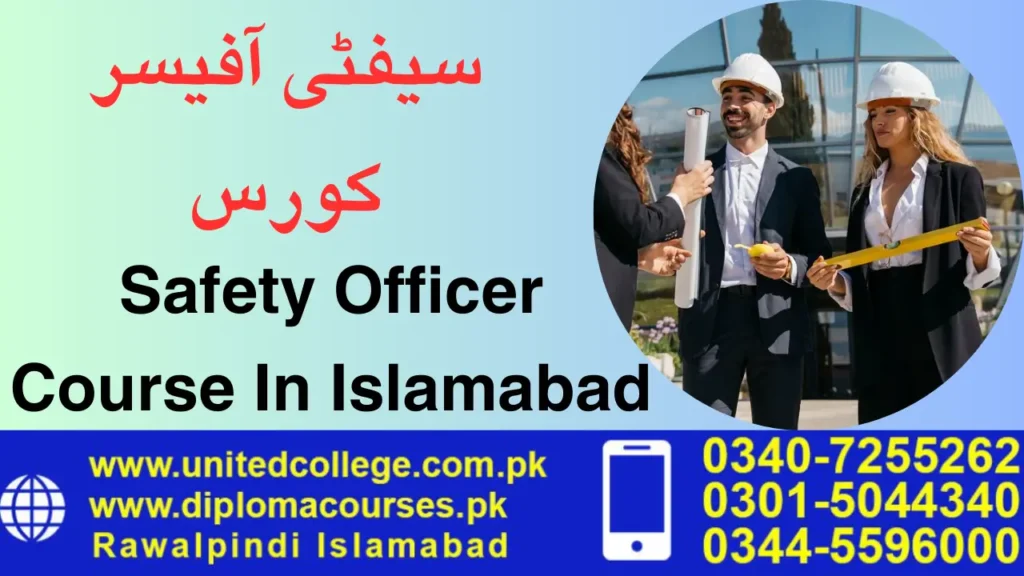Safety Officer Courses play a crucial role in ensuring workplace safety and compliance with regulations, making them essential for individuals aspiring to pursue a career in occupational health and safety. In Islamabad, a range of accredited institutions offer comprehensive training programs tailored to meet the evolving demands of the industry.
This article provides an in-depth exploration of the significance of the Safety Officer Course in Rawalpindi Islamabad, the diverse options available in Islamabad, accredited training providers, curriculum structures, career prospects, certification requirements, training methodologies, and future trends in safety officer education.
Importance of Safety Officer Courses
When it comes to workplace safety, Safety Officer Courses are like the unsung heroes – ensuring that your office doesn’t turn into a scene out of an action movie. From preventing slipping hazards to addressing emergency procedures, these courses are the backbone of a secure work environment.
But it’s not just about avoiding banana peel mishaps; it’s also about following the law. Legal Compliance and Regulations are as essential as that morning cup of coffee. Safety Officer Courses ensure that you’re not just keeping your employees safe, but you’re also keeping the long arm of the law satisfied.
Overview of Safety Officer Courses in Islamabad

In Islamabad, Safety Officer Courses come in more flavors than your local ice cream shop. With a Diversity of Courses Available, you can pick and choose based on your specific needs. Whether you’re a newbie looking to dip your toes in safety waters or a seasoned pro wanting to upskill, there’s a course that fits like a glove.
And let’s talk about convenience – these courses understand that you’re a busy bee. With flexible Duration and Schedule Options, you can squeeze in your safety knowledge between meetings and coffee breaks. No need to sacrifice your lunch hour to learn how to prevent workplace disasters.
Accredited Institutions Offering Safety Officer Courses
Not all heroes wear capes; some are just institutions offering Safety Officer Courses in Islamabad. These Leading Training Providers are like the Avengers of workplace safety, swooping in to save the day with their top-notch training programs. When you enrol in a course with them, you know you’re in good hands.
Quality Assurance and Accreditation are not just fancy terms; they’re the stamp of approval that ensures your course is legit. So rest easy knowing that your hard-earned money is going towards a course that meets industry standards and will make a difference in your workplace safety practices.
Curriculum and Course Structure
Forget boring textbooks and endless lectures; Safety Officer Courses in Islamabad are all about getting down and dirty with the Core Subjects Covered. From risk assessment to emergency response planning, these courses cover everything you need to know to keep your workplace safe.
But theory only gets you so far; that’s why Practical Training Components are crucial. These hands-on sessions give you a chance to apply what you’ve learned in real-life scenarios, so you’re not left scratching your head when a safety issue pops up. Because let’s face it, practice makes perfect – even in the safety world.
Career Opportunities for Safety Officers

Safety officers play a crucial role in ensuring workplace safety and compliance with regulations. As a safety officer, you can explore diverse career opportunities across various industries, including construction, manufacturing, healthcare, and oil and gas. The demand for qualified safety officers is on the rise, making it a promising field with excellent job prospects.
Industry Demand and Job Prospects
The increasing focus on occupational health and safety has led to a growing demand for skilled safety officers. Industries are prioritising employee well-being and compliance with safety standards, creating a need for competent professionals in this field. Safety officers can find employment in both public and private sectors, with opportunities for career advancement and specialisation.
Sector-specific Roles
The different industries have specific safety requirements thus employment of industry specific safety officers is almost inevitable. For instance, a safety officer based in construction might work with hazard identification and risk assessment, while one based in health care might specialise in infection control and emergency preparedness. Awareness of safety challenges specific to different industries is a key factor in successful risk management and creating safe working conditions.
Certification and Licensing Requirements

The only way to become certified safety officer is by meeting particular prerequisites, completing the relevant courses and passing the corresponding exams to demonstrate sufficient competence. It is worth noting that the required certification or licensing vary in different areas, so you should keep track of the regulations and remain updated with the industry standards.
Eligibility Criteria
In order to follow one’s career path to be a safety officer, the individuals usually should have a relevant educational background in occupational health and safety, environmental science or engineering. Some others certification might also need a certain level of experience working in a related field before being eligible for examination.
Examination and Assessment Process
The safety officer certification exams consider the knowledge of the candidate in the area of the safety regulations, risk management strategies, emergency response protocols, and other professional areas. The aspiring lockout/tagout officers will be assessed on their competency in the above areas to get certified. Hence, they will be able to deliver their responsibilities appropriately and satisfactorily.
Training Methodologies and Resources

Training is essential for the development of safety officers, which can be achieved by different teaching approaches and learning materials, in order to improve learning and development of skills. At their disposal are numerous tools and approaches, such as face to face training or distance learning, that safety officers can use to get the required knowledge and practical skill.
Instructor-led Training vs. Online Courses
Guidance from instructors enables learners to experience interactive learning, experts’ advice and instant feedback. Whereas, on the other hand, online courses give students flexibility and accessibility that permits them to learn at the pace that they prefer. Selecting the proper training methodology varies with your personality, learning method, and scheduling commitment.
Hands-on Learning Tools and Techniques
The hands-on learning tools like simulations, practical exercises, and site visits are vital elements that safety officers apply the theoretical knowledge in their real-world scenarios very effectively. Through the execution of practical activities, individuals can learn employable skills, problem solving and critical evaluation that could help them achieve safety practices in the workplace.
Future Trends in Safety Officer Education

Technology has been the key driving force in the evolution of safety officer education which is being further moulded by the latest technological advancements, new industry standards, and emerging specialisations. Keeping up with these trends can aid safety officers in meeting the changing demands, making use of new prospects, and enjoy professional growth.
Technological Advancements in Training
Technology is leading to a technological change in the process of safety officer training via virtual reality simulations, interactive e-learning platforms, and data analytics tools. These advancements create the opportunities of interactive learning experiences with tailored training programs and offer a possibility to monitor the performance metrics, which come in useful for the safety officers to develop their skills.
Industry Updates and Emerging Specializations
The safety industry is a dynamic environment with constantly changing safety standards, policies, and practices that define the roles and tasks of safety officers. Keeping up with industry trends and new specialisations in this profession, e.g. cybersecurity, ergonomics, and mental health at the workplace, is crucial to become and remain competitive, and cope with emerging safety issues. This will equip the budding safety officers with necessary knowledge and experience needed to take up higher positions and create safe workplaces. Thus, continued training techniques developments combined with latest trends in safety education ensures a promising future for the people who are committed to an occupational culture of safety and well-being.
Course Fee: 35000
Daily Class: 2 Hours
Course Duration: One Year
Morning / Evening
Call For Registration: 0344-5596000 / 0333-9014677 / 0340-7255262
FAQ
1. Are Safety Officer Courses in Islamabad recognized internationally?
Yes, Safety Officer Courses offered by fndcourse.pk in Islamabad are recognized internationally. Our courses adhere to globally accepted standards and are designed to equip individuals with the knowledge and skills needed to excel in safety management roles worldwide. With a comprehensive curriculum, experienced instructors, and industry-relevant training, our courses ensure that graduates are well-prepared to meet the demands of the international job market. Visit fndcourse.pk today to explore our internationally recognized Safety Officer Courses in Islamabad and kickstart your career in safety management!
2. What are the typical prerequisites for enrolling in a Safety Officer Course?
Typical prerequisites for enrolling in a Safety Officer Course often include a minimum educational qualification such as a high school diploma or equivalent, proficiency in the language of instruction (usually English), and a basic understanding of occupational health and safety concepts. Additionally, some courses may require prior work experience in relevant fields. At fndcourse.pk, we offer Safety Officer Courses designed to accommodate varying levels of expertise, ensuring comprehensive learning for aspiring safety professionals. Visit fndcourse.pk to explore our range of courses and kickstart your journey towards becoming a certified Safety Officer.
3. How long does it usually take to complete a Safety Officer Course in Islamabad?
Typically, completing a Safety Officer Course in Islamabad takes around 2 to 3 weeks, depending on the program’s duration and intensity. At fndcourse.pk, we offer comprehensive Safety Officer Courses designed to equip you with essential skills efficiently. Our expert instructors ensure a thorough understanding of safety protocols, empowering you for a successful career in occupational safety. Visit fndcourse.pk today to explore our course offerings and kickstart your journey towards becoming a certified safety professional.
4. How can I stay updated on the latest trends and developments in safety officer education?
To stay updated on the latest trends and developments in safety officer education, regularly visit reputable industry websites, subscribe to relevant newsletters, and engage with professional communities on platforms like LinkedIn. Additionally, consider enrolling in online courses offered by fndcourse.pk, a platform dedicated to providing cutting-edge safety officer education. With a wide range of courses and resources tailored to your needs, fndcourse.pk ensures you stay informed and equipped with the latest knowledge and skills to excel in safety officer roles. Visit fndcourse.pk today to elevate your safety education journey!

